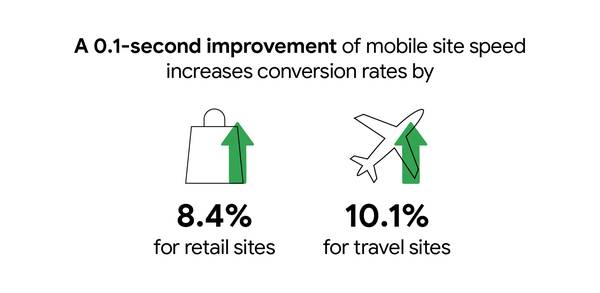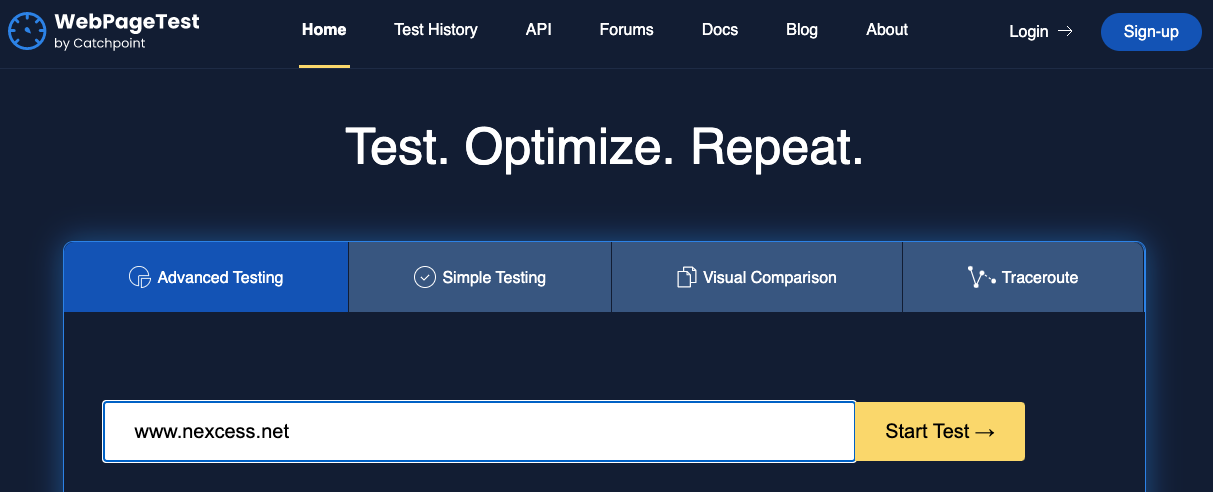Why Website Performance Matters More than Ever
Consider all the time and effort it takes to gather content, design your website, and attract visitors. If they come to your website but leave before they find what they want, it’s a tragic waste.
Your content could be completely relevant to your visitors, but they won’t stick around to wait for that page to load. That’s one of the reasons why page speed matters.
Speed is crucial to improving website performance — but it’s only one factor. We’re going to explain precisely why website performance matters, and how a subpar website can undermine your digital marketing efforts.
Why Page Speed Matters in Improving Website Performance
A speedy website is critical to online businesses. The days of dial-up are long gone — if your user experience involves impatient toe-tapping, it will also involve a disheartening bounce rate.
A positive user experience and ecommerce success go hand in hand. Your website’s users need to be happy whether they visit on a desktop or their smartphone.
According to Perficent, 61% of website traffic came from mobile devices in 2021 — but those connections are typically slower.
If you want to stay competitive in the fast-changing ecommerce world, then improving your website performance on all platforms is key.
Here are more reasons why page speed matters to your website performance.
How to Create a WordPress Performance Tuning Strategy >>
Page Speed Impacts Your Google Ranking
Google wants to give its users the best solution to their queries. People want the quickest answers to their questions. So, a faster web page with the right information will rank better than a slower page with similar content.
In its 2018 Speed Update, Google confirmed it would continue to use page speed as a key ranking factor in its algorithms. This is part of its effort to make the internet ultra-fast, functional, and highly accessible. You’re rewarded with a higher position on the search engine results pages (SERPs) if your website has faster load times.
A Quick Website Enhances Your Brand’s Credibility
In addition to an improved user experience, measuring your website speed and optimizing it can make your business seem more legitimate.
According to Statista, from 2014 to 2021, the amount of digital buyers has only increased. At the same time, more sketchy website owners have popped up to scam those consumers.
But you’re a responsible business owner — you want a credible ecommerce storefront to communicate that to potential customers. Improve website performance to present your brand as reliable and professional.
Website Speed Influences Shopping Behaviour

You should be measuring website speed like you track your sales — because, in ecommerce businesses, a mere fraction of a second can equal a significant increase in revenue.
According to 2020 research from Google, a 0.1-second improvement in mobile website speed resulted in an 8.4% increase in conversion rates for retail businesses.
If your website is slow, you’re leaving money on the table.
A Faster Website Reduces Bounce Rates
Website bounce rates indicate the percentage of visitors who leave after they view only one page.
Poor website performance can instantly repel potential customers. And the attention span of internet users is only getting shorter. A 2017 report from Akamal Technologies found a two-second delay in page load time could increase a website’s bounce rate by 103%.
If you want to speed up your website, start by assessing your hosting service. Hostdedi offers managed WordPress hosting with features designed to make your website ultra-fast.
Key Metrics to Help Improve Website Performance
Now you know why page speed matters to your website’s performance.
But how do you diagnose the factors that slow down your website?
There is a multitude of factors that can contribute to a slow loading time, including:
Here’s the good news:
Improving your website performance doesn’t have to be complicated. Let’s dive into a few key metrics to help you assess your ecommerce website — and where you can make your store faster.
Website Performance Metrics
- Website speed
- Bounce rate
- Number of page visitors
- Session duration
- Traffic sources
- Exit page
Google Analytics: The Website-Improvement Power Tool

There are many performance analytic tools that can help, but Google Analytics leads the charge. For WordPress websites, it’s the single most helpful performance tool. By measuring your website speed, Google Analytics gives you the data you need to increase search engine optimization (SEO).
Web performance metrics provide useful information that give you actionable options for optimizing your website. We’re going to dig into some of the most important metrics to check and improve your website’s performance.
1. Website Speed

We’ve covered why page speed matters to improving your website’s performance.
- It gives you a higher search ranking in search engines.
- It improves your website’s credibility.
- It boosts your conversion rates.
- It reduces your bounce rate.
There are several measurements that determine your average website speed, including time to first byte (TTFB), DNS lookup time, and server response time. GTMetrics and WebPage Test are free analytics tools for measuring website speed. They also provide useful suggestions on how to improve scores and make your website faster.
Improving your website speed starts with good quality hosting. Even if you don’t use WordPress, Fully Managed Magento Hosting from Hostdedi can optimize your ecommerce website for speed, security, and scale.
2. Bounce Rate
Your bounce rate is the percentage of visitors who leave your website without taking any important action on a particular page. High bounce rates might indicate visitors can’t find what they want on your website.
Statistics indicate that as page load time increases from 1-5 seconds, the bounce rate might increase by as much as 90%. This further explains why page speed matters for your visitors.
3. Number of Page Visitors
Screenshot – ALT: Screenshot of Live Traffic Feed
While the number of visitors who view your website may not tell you a lot about your website’s technical performance, it can tell you if your content is a bigger problem than a slow website.
The number of visitors allows you to gauge how engaging or appealing your website is. Low numbers mean less traffic, and so you need to take action. To see who is visiting your website, use real-time visitor tracking tools, such as the live traffic view inside Google Analytics.
4. Session Duration
This metric calculates the time a visitor actively interacts on your website. Session duration is an especially good metric to measure performance for an online store. If visitors spend a lot of time exploring the links and pages for your products and services, you can surmise they’re interested in what you offer.
You can also surmise a slow website isn’t frustrating users and preventing them from happily clicking around on your website for as long as they want.
5. Traffic Sources
You need to find out which traffic sources are bringing visitors to your website. The most probable traffic sources include organic search, banner ads, and referrals.
This metric compares each of these sources and can be an indication of how your website is performing. A large volume of referral traffic, for example, can indicate that your business is becoming popular on other websites or on social media.
6. Exit Page
Like most websites, your online store might have various steps in the conversion process. When visitors leave before completing a purchase, you need to ask why.
A person might have simply changed their mind — but they might have also been turned off by a complex process. When you know when most users leave, you can optimize your website to increase conversions.
Final Thoughts: Why Website Performance Matters + How to Improve Performance
You should now have a good sense of why website performance matters to your online business. This knowledge and the right metric analysis can empower you to assess whether you’re doing everything possible to optimize your company’s bottom line.
Google Analytics is a free tool to help you measure website speed. It also measures the metrics that are most relevant to your business and lets you know if your website is operating at peak performance.
If you just created a new website, measuring your website speed should be top of the list. It allows you to optimize your pages for speed.
Improve Your Website Performance With Hostdedi
Improving your website’s performance starts with high-quality hosting.
Hostdedi’s experts understand why website performance matters, and we can help you choose the best product for optimal performance. We have products that can optimize established websites, or give new entrepreneurs the ability to hit the internet running (fast!) with StoreBuilder from Hostdedi.
If your online business has the need for speed, check out what Hostdedi has to offer today.



